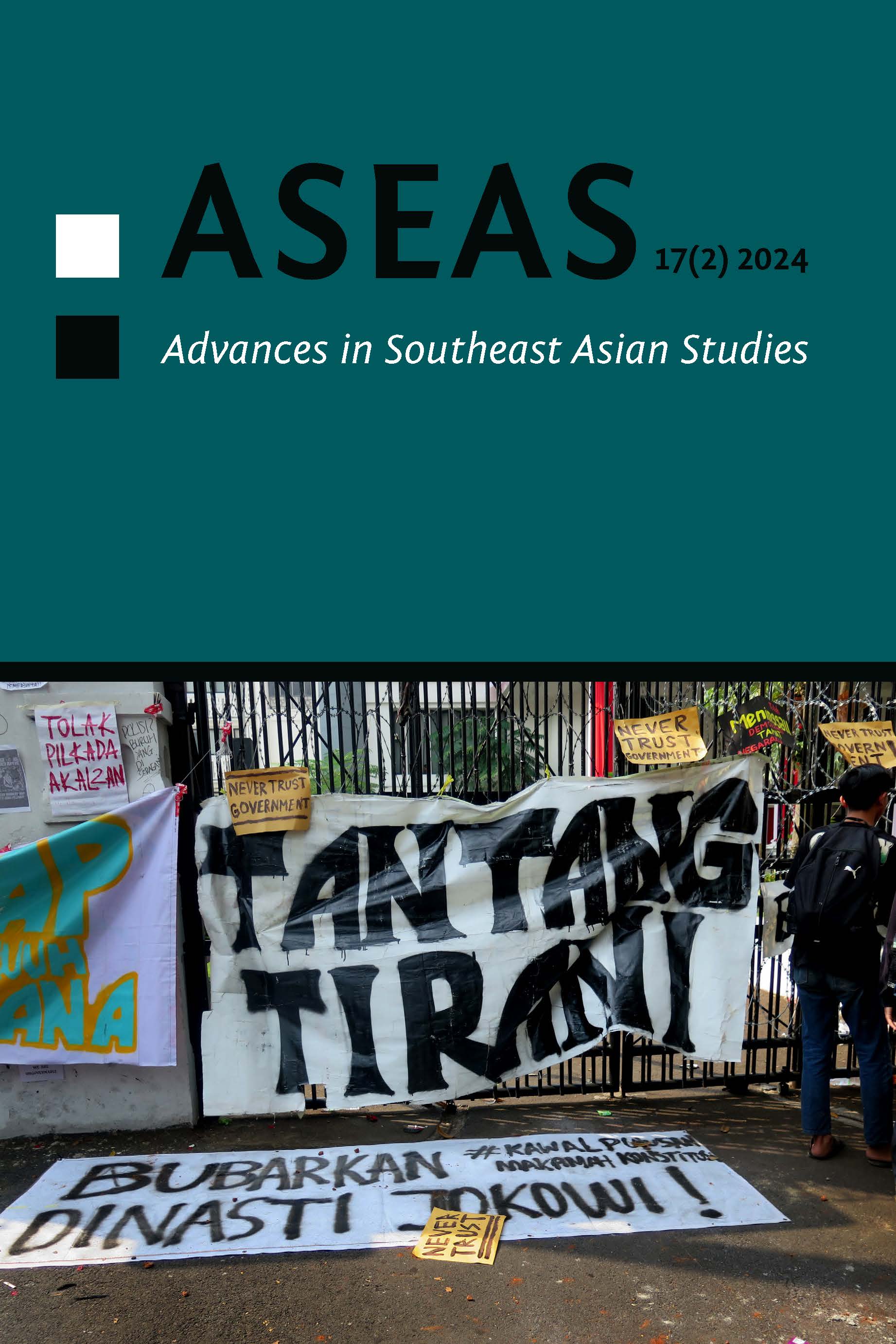‘Mabuhay ang Filipina!’: The Independence of the Philippines in the Imaginations of Indonesian Freedom Fighters in the Context of the Dutch-Indonesian War
DOI:
https://doi.org/10.14764/10.ASEAS-0117Keywords:
Indonesien Independence, Indonesia-Philippines Relations, Media Representations, Philippine Independence, Postwar Southeast AsiaAbstract
This study discusses a pivotal but forgotten aspect in the history of Indonesia-Philippines relations, namely how the Indonesian freedom fighters, who were in conflict with the Dutch, responded Philippine independence, which was proclaimed and acknowledged on July 4, 1946. This study, using Indonesian print media published between June-July 1946, shows that Indonesian freedom fighters devoted considerable attention to Philippine independence and they showed it with various expressions and mediums, including speeches, writings, editorials, congratulatory letters, news and photographs. The Indonesian nationalists not only congratulated the Philippines on its independence, but also made Philippine independence a momentum to evaluate and reflect on the struggle for Indonesian independence, including by using the Philippines as an example of how a young country can educate its people, emancipate its women and have an important position in the international world, mainly because of its good relations with the United States. Indonesia and the Philippines were also narrated to have close relations, both as brothers and as neighbors, and have the potential to build cooperation in the future. These perspectives contributed to providing moral strength and confidence for Indonesian fighters in defending their independence in the context of the Dutch-Indonesian war and postwar decolonization in Asia.
References
Abell, Robyn Janet. (1972). Philippine policy towards regional cooperation in Southeast Asia, 1961-1969. PhD dissertation, Australian National University.
Anwar, Rosihan. “Manuel Roxas: Presiden Repoeblik Filipina” [Manuel Roxas: President of the Republic of the Philippines]. (1946, July 6). Minggoean Merdeka.
Anwar, Rosihan. “Pribadi Poedjangga Rizal” [The Personality of Poet Rizal]. (1946, July 6). Minggoean Merdeka.
Bhakti, Ikrar Nusa. (2010). Bilateral relations between Indonesia and the Philippines: Stable and fully cooperative. In N. Ganesan & Ramses Amer (Eds.). International relations in Southeast Asia: Between bilateralism and multilateralism. ISEAS.
Daroesman, Maroeto. “Filipina Merdeka” [Independent Philippines]. (1946, July 6). Minggoean Merdeka.
De Viana, Augusto V. (2013). The Philippine view of Indonesian independence: As reported in Philippine newspapers. Jurnal Kajian Wilayah, 4 (1), 2013, 3-24.
Diah, Herawati. “Filipina jang saja kenal” [The Philippines I know]. (1946, July 6). Minggoean Merdeka.
Hari ini Philipina Merdeka: Indonesia Philipina selajaknya bekerdja rapat [Today the Philippines is Independent: Indonesia and the Philippines should work closely together]. (1946, July 4). Kedaulatan Rakjat.
Hari kemerdekaan Pilipina: Panitya Penjamboetan Dibentoek [Philippine Independence Day: Welcome committee formed]. (1946, July 2). Kedaulatan Rakjat.
Kemerdekaan [Independence]. (1946, July 4). Kedaulatan Rakjat.
Mall, David John. (1959). A Historical analysis of the principal speeches of Carlos P. Romulo at the Asian-African Conference. MA Thesis, Michigan State University of Agriculture and Applied Science.
McMillan, Richard. (2005). The British Occupation of Indonesia: Britain, the Netherlands and the Indonesian Revolution. Routledge.
Menjamboet Philipina merdeka [“Welcoming an independent Philippines”]. (1946, July 5).
Nery, John. (2011). Revolutionary Spirit: Jose Rizal in Southeast Asia. ISEAS.
Oetjapan selamat kepada Presiden Roxas dari Kongres Pemoeda Andalas Selatan [Congratulations to President Roxas of the South Andalas Youth Congress]. (1946, July 4). Antara.
Oetjapan selamat kepada Presiden Pilipina dari Partai Rakjat [Congratulations to the President of the Philippines from the People's Party]. (1946, June 6). Antara.
Philipina melaloei djembatan emas [Philippines crosses the golden bridge]. (1946, July 5). Kedaulatan Rakjat.
Philippine and the U.S. (1946, July 13). The Voice of Free Indonesia.
Pilipina merdeka [Philippines becomes independent]. (1946, July 5). Kedaulatan Rakjat.
Poetera, Adi. “Wanita Filipina dalam Tingkatan Kemadjoean” [Filipino Women in the Level of Progress]. (1946, July 6). Minggoean Merdeka.
Poeze, Harry A. (2009). Tan Malaka, Gerakan Kiri, dan Revolusi Indonesia. Jilid II: Maret 1946-Maret 1947 [Tan Malaka, the Left Movement, and the Indonesian Revolution. Volume II: March 1946-March 1947]. Yayasan Obor Indonesia & KITLV-Jakarta.
Rapat samodera menjamboet hari kemerdekaan Pilipina [A mass meeting to welcome Philippine Independence Day]. (1946, July 2). Kedaulatan Rakjat.
Repoeblik Pilipina dan Repoeblik Indonesia akan menjokong perdamaian jang kekal [The Republic of the Philippines and the Republic of Indonesia will support lasting peace]. (1946, July 4). Kedaulatan Rakjat.
Roesnadi, Otto Sutomo. (1970). Indonesia-Philippine Relations, 1961-1965. 1970. PhD dissertation, Jawaharlal Nehru University.
Samboetan-samboetan hari kemerdekaan Pilipina [Greetings related to Philippine Independence Day]. (1946, July 4). Kedaulatan Rakjat.
Semar. “Podjok: Pilipina merdeka” [Podjok: independent Philippines]. (1946, July 4). Kedaulatan Rakjat.
Sjaaf, M. “Carlos P. Romulo: Pahlawan Demokrasi” [Carlos P. Romulo: Hero of Democracy]. (1946, July 6). Minggoean Merdeka.
Soematera ikoet merajakan hari kemerdekaan Pilipina [Sumatra joins in celebrating Philippine Independence Day]. (1946, July 19). Antara.
Tan-Cullamar, Evelyn. (1993). “The Indonesian diaspora and Philippine-Indonesian relations.” Philippine Studies, 41 (1), 38-50.
Tasrif, S. “Riwajat hidoep Rizal” [Rizal’s life history]. (1946, July 6). Minggoean Merdeka.
Downloads
Published
Issue
Section
License
Copyright (c) 2024 Muhammad Yuanda Zara

This work is licensed under a Creative Commons Attribution-NonCommercial-NoDerivatives 4.0 International License.
For all articles published in ASEAS before December 2014 and after July 2022, copyright is retained by the authors. For articles published between January 2015 and June 2022, the Society for South-East Asian Studies (SEAS) is the copyright holder. Articles published in ASEAS before December 2019 are licensed under the following Creative Commons License: Attribution-NonCommercial-NoDerivs 3.0 Unported. Articles published after that date are licensed under the following Creative Commons License: Attribution-NonCommercial-NoDerivs 4.0 International. In both cases, this means that everybody is free to share (to copy, to distribute, and to transmit the work) under the following conditions:
-
Attribution — You must give appropriate credit, provide a link to the license, and indicate if changes were made. You may do so in any reasonable manner, but not in any way that suggests the licensor endorses you or your use.
-
NonCommercial — You may not use the material for commercial purposes.
-
NoDerivatives — If you remix, transform, or build upon the material, you may not distribute the modified material.


